THE NARRATIVES OF LOCAL CHILDREN AND NEWLY ARRIVING FORCED MIGRANT CHILDREN ABOUT THEIR MUTUAL CONTACTS AND FRIENDSHIPS IN GERMAN PRIMARY SCHOOLS
THE NARRATIVES OF LOCAL CHILDREN AND NEWLY ARRIVING FORCED MIGRANT CHILDREN ABOUT THEIR MUTUAL CONTACTS AND FRIENDSHIPS IN GERMAN PRIMARY SCHOOLS
Author(s): Caterina Rohde-AbubaSubject(s): School education, Migration Studies, Ethnic Minorities Studies, Sociology of Education
Published by: Центр независимых социологических исследований (ЦНСИ)
Keywords: Childhood; Forced Migration; Social Integration; Friendship Making; Children’s Agency;
Summary/Abstract: Even though almost half of the forced migrant population that entered Germany during the last several years are minors, research about the perspective of children on forced migration is very scarce. Drawing on childhood studies, which regard children as being capable of social thinking and acting, and generational theories, which scrutinize how childhood constitutes a common “social space,” this article aims to analyze narratives of local and forced migrant primary school children on flight and integration. Current regulations of the German educational system insert forced migrant children into the regular school system. Within the restrictive framework of schools, which disadvantage newly arriving migrant children by focusing on their German language skills as the primary marker of their educational potential and success, friendship-making is the sphere where children can have agency. Children construct the school as their common generational space and discuss flight as the experience of “being new in school.” This allows children to acknowledge their different biographical backgrounds but empathize with each other and identify as generational members through their subjection to the educational system. Local and forced migrant children bridge language differences by performing their friendships through language-learning rituals. Hence, the public primary school system sets preconditions for the structural integration of local and migrant children, but the most important actors who “do integration” as a social process are children themselves.
Journal: Laboratorium. Журнал социальных исследований
- Issue Year: 12/2020
- Issue No: 3
- Page Range: 52-69
- Page Count: 18
- Language: English

